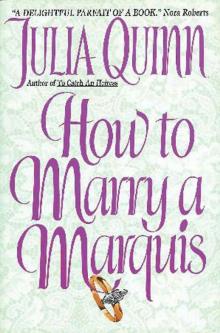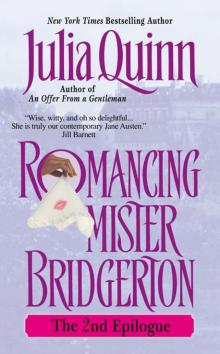- Home
- Julia Quinn
An Offer From a Gentleman: The 2nd Epilogue Page 6
An Offer From a Gentleman: The 2nd Epilogue Read online
Page 6
He touched her lips and she felt it in her toes. It was a singularly odd—and singularly wonderful—sensation.
Then his hand at the small of her back—the one that had guided her so effortlessly in their waltz—started to pull her toward him. The pressure was slow but inexorable, and Sophie grew hot as their bodies grew closer, then positively burned when she suddenly felt the length of him pressing against her.
He seemed very large, and very powerful, and in his arms she felt like she must be the most beautiful woman in the world.
Suddenly anything seemed possible, maybe even a life free of servitude and stigma.
His mouth grew more insistent, and his tongue darted out to tickle the corner of her mouth. His hand, which had still been holding hers in a waltz-pose, slid down the length of her arm and then up her back until it rested at the nape of her neck, his fingers tugging her hair loose from its coiffure.
“Your hair is like silk,” he whispered, and Sophie actually giggled, because he was wearing gloves.
He pulled away. “What,” he asked with an amused expression, “are you laughing about?”
“How can you know what my hair feels like? You’re wearing gloves.”
He smiled, a crooked, boyish sort of a smile that sent her stomach into flips and melted her heart. “I don’t know how I know,” he said, “but I do.” His grin grew even more lopsided, and then he added, “But just to be sure, perhaps I’d better test with my bare skin.”
He held out his hand before her. “Will you do the honors?”
Sophie stared at his hand for a few seconds before she realized what he meant. With a shaky, nervous breath, she took a step back and brought both of her hands to his. Slowly she pinched the end of each of the glove’s fingertips and gave it a little tug, loosening the fine fabric until she could slide the entire glove from his hand.
Glove still dangling from her fingers, she looked up. He had the oddest expression in his eyes. Hunger . . . and something else. Something almost spiritual.
“I want to touch you,” he whispered, and then his bare hand cupped her cheek, the pads of his fingers lightly stroking her skin, whispering upward until they touched the hair near her ear. He tugged gently until he pulled one lock loose. Freed from the coiffure, her hair sprang into a light curl, and Sophie could not take her eyes off it, wrapped golden around his index finger.
“I was wrong,” he murmured. “It’s softer than silk.”
Sophie was suddenly gripped by a fierce urge touch him in the same way, and she held out her hand. “It’s my turn,” she said softly.
His eyes flared, and then he went to work on her glove, loosening it at the fingers the same way she had done. But then, rather than pulling it off, he brought his lips to the edge of the long glove, all the way above her elbow, and kissed the sensitive skin on the inside of her arm. “Also softer than silk,” he murmured.
Sophie used her free hand to grip his shoulder, no longer confident of her ability to stand.
He tugged at the glove, allowing it to slide off her arm with agonizing slowness, his lips following its progress until they reached the inside of her elbow. Barely breaking the kiss, he looked up and said, “You don’t mind if I stay here for a bit.”
Helplessly, Sophie shook her head.
His tongue darted out and traced the bend of her arm.
“Oh, my,” she moaned.
“I thought you might like that,” he said, his words hot against her skin.
She nodded. Or rather, she meant to nod. She wasn’t sure if she actually did.
His lips continued their trail, sliding sensuously down her forearm until they reached the inside of her wrist. They remained there for a moment before finally coming to rest in the absolute center of her palm.
“Who are you?” he asked, lifting his head but not letting go of her hand.
She shook her head.
“I have to know.”
“I can’t say.” And then, when she saw that he would not take no for an answer, she lied and added, “Yet.”
He took one of her fingers and rubbed it gently against his lips. “I want to see you tomorrow,” he said softly. “I want to call on you and see where you live.”
She said nothing, just held herself steady, trying not to cry.
“I want to meet your parents and pet your damned dog,” he continued, somewhat unsteadily. “Do you understand what I mean?”
Music and conversation still drifted up from below, but the only sound on the terrace was the harsh rasp of their breath.
“I want—” His voice dropped to a whisper, and his eyes looked vaguely surprised, as if he couldn’t quite believe the truth of his own words. “I want your future. I want every little piece of you.”
“Don’t say anything more,” she begged him. “Please. Not another word.”
“Then tell me your name. Tell me how to find you tomorrow.”
“I—” But then she heard a strange sound, exotic and ringing. “What is that?”
“A gong,” he replied. “To signal the unmasking.”
Panic rose within her. “What?”
“It must be midnight.”
“Midnight?” she gasped.
He nodded. “Time to remove your mask.”
One of Sophie’s hands flew up to her temple, pressing the mask harshly against her skin, as if she could somehow glue it onto her face through sheer force of will.
“Are you all right?” Benedict asked.
“I have to go,” she blurted out, and then, with no further warning, she hitched up her skirts and ran from the terrace.
“Wait!” she heard him call out, felt the rush of air as his arm swiped forward in a futile attempt to grab her dress.
But Sophie was fast, and perhaps more importantly, she was in a state of utter panic, and she tore down the stairs as if the fires of hell were nipping at her heels.
She plunged into the ballroom, knowing that Benedict would prove a determined pursuer, and she’d have the best chance of losing him in a large crowd. All she had to do was make it across the room, and then she could exit via the side door and scoot around the outside of the house to her waiting carriage.
The revelers were still removing their masks, and the party was loud with raucous laughter. Sophie pushed and jostled, anything to beat her way to the other side of the room. She threw one desperate glance over her shoulder. Benedict had entered the ballroom, his face intense as he scanned the crowd. He didn’t seem to have seen her yet, but she knew that he would; her silver gown would make her an easy target.
Sophie kept shoving people out of her way. At least half of them didn’t seem to notice; probably too drunk. “Excuse me,” she muttered, elbowing Julius Caesar in the ribs. “Beg pardon,” came out more like a grunt; that was when Cleopatra stepped on her toe.
“Excuse me, I—” And then the breath was quite literally sucked out of her, because she found herself face-to-face with Araminta.
Or rather, face to mask. Sophie was still disguised. But if anyone could recognize her, it would be Araminta. And—
“Watch where you’re going,” Araminta said haughtily. Then, while Sophie stood openmouthed, she swished her Queen Elizabeth skirts and swept away.
Araminta hadn’t recognized her! If Sophie hadn’t been so frantic about getting out of Bridgerton House before Benedict caught up with her, she would have laughed with delight.
Sophie glanced desperately behind her. Benedict had spotted her and was pushing his way through the crowd with considerably more efficiency than she had done. With an audible gulp and renewed energy, she pushed forth, almost knocking two Grecian goddesses to the ground before finally reaching the far door.
She looked behind her just long enough to see that Benedict had been waylaid by some elderly lady with a cane, then ran out of the building and around front, where the Penwood carriage was waiting, just as Mrs. Gibbons had said it would.
“Go, go, go!” Sophie shouted frantically to the driver.
And she was gone.
Chapter 4
More than one masquerade attendee has reported to This Author that Benedict Bridgerton was seen in the company of an unknown lady dressed in a silver gown.
Try as she might, This Author has been completely unable to discern the mystery lady’s identity. And if This Author cannot uncover the truth, you may be assured that her identity is a well-kept secret indeed.
LADY WHISTLEDOWN’S SOCIETY PAPERS, 7 JUNE 1815
She was gone.
Benedict stood on the pavement in front of Bridgerton House, surveying the street. All of Grosvenor Square was a mad crush of carriages. She could be in any one of them, just sitting there on the cobbles, trying to escape the traffic. Or she could be in one of the three carriages that had just escaped the tangle and rolled around the corner.
Either way, she was gone.
He was half-ready to strangle Lady Danbury, who’d jammed her cane onto his toe and insisted upon giving him her opinion on most of the partygoers’ costumes. By the time he’d managed to free himself, his mystery lady had disappeared through the ballroom’s side door.
And he knew that she had no intention of letting him see her again.
Benedict let out a low and rather viciously uttered curse. With all the ladies his mother had trotted out before him—and there had been many—he’d never once felt the same soul-searing connection that had burned between him and the lady in silver. From the moment he’d seen her—no, from the moment before he’d seen her, when he’d only just felt her presence, the air had been alive, crackling with tension and excitement. And he’d been alive, too—alive in a way he hadn’t felt for years, as if everything were suddenly new and sparkling and full of passion and dreams.
And yet . . .
Benedict cursed again, this time with a touch of regret.
And yet he didn’t even know the color of her eyes.
They definitely hadn’t been brown. Of that much he was positive. But in the dim light of the candled night, he’d been unable to discern whether they were blue or green. Or hazel or gray. And for some reason he found this the most upsetting. It ate at him, leaving a burning, hungry sensation in the pit of his stomach.
They said eyes were the windows to the soul. If he’d truly found the woman of his dreams, the one with whom he could finally imagine a family and a future, then by God he ought to know the color of her eyes.
It wasn’t going to be easy to find her. It was never easy to find someone who didn’t want to be found, and she’d made it more than clear that her identity was a secret.
His clues were paltry at best. A few dropped comments concerning Lady Whistledown’s column and . . .
Benedict looked down at the single glove still clutched in his right hand. He’d quite forgotten that he’d been holding it as he’d dashed through the ballroom. He brought it to his face and inhaled its scent, but much to his surprise, it didn’t smell of rosewater and soap, as had his mystery lady. Rather, its scent was a bit musty, as if it had been packed away in an attic trunk for many years.
Odd, that. Why would she be wearing an ancient glove?
He turned it over in his hand, as if the motion would somehow bring her back, and that was when he noticed a tiny bit of stitching at the hem.
SLG. Someone’s initials.
Were they hers?
And a family crest. One he did not recognize.
But his mother would. His mother always knew that sort of thing. And chances were, if she knew the crest, she’d know who the initials SLG belonged to.
Benedict felt his first glimmer of hope. He would find her.
He would find her, and he would make her his. It was as simple as that.
It took a mere half hour to return Sophie to her regular, drab state. Gone were the dress, the glittering earbobs, and the fancy coiffure. The jeweled slippers were tucked neatly back in Araminta’s closet, and the rouge the maid had used for her lips was resting in its place on Rosamund’s dressing table. She’d even taken five minutes to massage the skin on her face, to remove the indentations left by the mask.
Sophie looked as she always looked before bed—plain, simple, and unassuming, her hair pulled into a loose braid, her feet tucked into warm stockings to keep out the chill night air.
She was back to looking what she was in truth—nothing more than a housemaid. Gone were all traces of the fairy princess she’d been for one short evening.
And saddest of all, gone was her fairy prince.
Benedict Bridgerton had been everything she’d read in Whistledown. Handsome, strong, debonair. He was the stuff of a young girl’s dreams, but not, she thought glumly, of her dreams. A man like that didn’t marry an earl’s by-blow. And he certainly didn’t marry a housemaid.
But for one night he’d been hers, and she supposed that would have to be enough.
She picked up a little stuffed dog she’d had since she’d been a small girl. She’d kept it all these years as a reminder of happier times. It usually sat on her dresser, but for some reason she wanted it closer right now. She crawled into bed, the little dog tucked under her arm, and curled up under the covers.
Then she squeezed her eyes shut, biting her lip as silent tears trickled onto her pillow.
It was a long, long night.
“Do you recognize this?”
Benedict Bridgerton was sitting next to his mother in her very feminine rose-and-cream drawing room, holding out his only link to the woman in silver. Violet Bridgerton took the glove and examined the crest. She needed only a second before she announced, “Penwood.”
“As in ‘Earl of’?”
Violet nodded. “And the G would be for Gunningworth. The title recently passed out of their family, if I recall correctly. The earl died without issue . . . oh, it must have been six or seven years ago. The title went to a distant cousin. And,” she added with a disapproving nod of her head, “you forgot to dance with Penelope Featherington last night. You’re lucky your brother was there to dance in your stead.”
Benedict fought a groan and tried to ignore her scolding. “Who, then, is SLG?”
Violet’s blue eyes narrowed. “Why are you interested?”
“I don’t suppose,” Benedict said on a groan, “that you will simply answer my question without posing one of your own.”
She let out a ladylike snort. “You know me far better than that.”
Benedict just managed to stop himself from rolling his eyes.
“Who,” Violet asked, “does the glove belong to, Benedict?” And then, when he didn’t answer quickly enough for her taste, she added, “You might as well tell me everything. You know I will figure it out on my own soon enough, and it will be far less embarrassing for you if I don’t have to ask any questions.”
Benedict sighed. He was going to have to tell her everything. Or at least, almost everything. There was little he enjoyed less than sharing such details with his mother—she tended to grab hold of any hope that he might actually marry and cling on to it with the tenacity of a barnacle. But he had little choice. Not if he wanted to find her.
“I met someone last night at the masquerade,” he finally said.
Violet clapped her hands together with delight. “Really?”
“She’s the reason I forgot to dance with Penelope.”
Violet looked nearly ready to die of rapture. “Who? One of Penwood’s daughters?” She frowned. “No, that’s impossible. He had no daughters. But he did have two stepdaughters.” She frowned again. “Although I must say, having met those two girls . . . well . . .”
“Well, what?”
Violet’s brow wrinkled as she fumbled for polite words. “Well, I simply wouldn’t have guessed you’d be interested in either of them, that’s all. But if you are,” she added, her face brightening considerably, “then I shall surely invite the dowager countess over for tea. It’s the very least I can do.”
Benedict started to say something, then stopped when he saw that his mot
her was frowning yet again. “What now?” he asked.
“Oh, nothing,” Violet said. “Just that . . . well . . .”
“Spit it out, Mother.”
She smiled weakly. “Just that I don’t particularly like the dowager countess. I’ve always found her rather cold and ambitious.”
“Some would say you’re ambitious as well, Mother,” Benedict pointed out.
Violet pulled a face. “Of course I have great ambition that my children marry well and happily, but I am not the sort who’d marry her daughter off to a seventy-year-old man just because he was a duke!”
“Did the dowager countess do that?” Benedict couldn’t recall any seventy-year-old dukes making recent trips to the altar.
“No,” Violet admitted, “but she would. Whereas I—”
Benedict bit back a smile as his mother pointed to herself with great flourish.
“I would allow my children to marry paupers if it would bring them happiness.”
Benedict raised a brow.
“They would be well-principled and hardworking paupers, of course,” Violet explained. “No gamblers need apply.”
Benedict didn’t want to laugh at his mother, so instead he coughed discreetly into his handkerchief.
“But you should not concern yourself with me,” Violet said, giving her son a sideways look before punching him lightly in the arm.
“Of course I must,” he said quickly.
She smiled serenely. “I shall put aside my feelings for the dowager countess if you care for one of her daughters . . .” She looked up hopefully. “Do you care for one of her daughters?”
“I have no idea,” Benedict admitted. “I never got her name. Just her glove.”
Violet gave him a stern look. “I’m not even going to ask how you obtained her glove.”
“It was all very innocent, I assure you.”
Violet’s expression was dubious in the extreme. “I have far too many sons to believe that,” she muttered.
“The initials?” Benedict reminded her.
Violet examined the glove again. “It’s rather old,” she said.

 Just Like Heaven
Just Like Heaven B03.2 An Offer from a Gentleman Ep II
B03.2 An Offer from a Gentleman Ep II How to Marry a Marquis
How to Marry a Marquis When He Was Wicked: The 2nd Epilogue
When He Was Wicked: The 2nd Epilogue Ten Things I Love About You
Ten Things I Love About You The Viscount Who Loved Me
The Viscount Who Loved Me The Duke and I
The Duke and I B05.2 To Sir Philip With Love Ep II
B05.2 To Sir Philip With Love Ep II An Offer From a Gentleman: The 2nd Epilogue
An Offer From a Gentleman: The 2nd Epilogue Minx
Minx On the Way to the Wedding with 2nd Epilogue
On the Way to the Wedding with 2nd Epilogue Mr. Cavendish, I Presume
Mr. Cavendish, I Presume A Night Like This
A Night Like This Splendid
Splendid Everything and the Moon
Everything and the Moon When He Was Wicked
When He Was Wicked Dancing at Midnight
Dancing at Midnight Bridgerton 04: 2nd Epilogue - Romancing Mister Bridgerton
Bridgerton 04: 2nd Epilogue - Romancing Mister Bridgerton The Lost Duke of Wyndham
The Lost Duke of Wyndham To Sir Phillip, With Love
To Sir Phillip, With Love It's in His Kiss
It's in His Kiss The Other Miss Bridgerton
The Other Miss Bridgerton Bridgerton 02: 2nd Epilogue - The Viscount Who Loved Me
Bridgerton 02: 2nd Epilogue - The Viscount Who Loved Me The Secrets of Sir Richard Kenworthy
The Secrets of Sir Richard Kenworthy On the Way to the Wedding
On the Way to the Wedding The Secret Diaries of Miss Miranda Cheever
The Secret Diaries of Miss Miranda Cheever Because of Miss Bridgerton
Because of Miss Bridgerton What Happens in London
What Happens in London JQuinn - The Secret Diaries of Miss Miranda Cheever
JQuinn - The Secret Diaries of Miss Miranda Cheever The Girl With the Make-Believe Husband
The Girl With the Make-Believe Husband First Comes Scandal
First Comes Scandal To Catch an Heiress
To Catch an Heiress The Sum of All Kisses
The Sum of All Kisses An Offer From a Gentleman
An Offer From a Gentleman The Bridgertons: Happily Ever After
The Bridgertons: Happily Ever After Bridgerton Collection Volume 1 (Bridgertons)
Bridgerton Collection Volume 1 (Bridgertons) Lady Whistledown Strikes Back
Lady Whistledown Strikes Back Secret Diaries of Miss Miranda Cheever
Secret Diaries of Miss Miranda Cheever An Offer from a Gentleman with 2nd Epilogue
An Offer from a Gentleman with 2nd Epilogue Four Weddings and a Sixpence
Four Weddings and a Sixpence An Offer from a Gentleman: The Epilogue II
An Offer from a Gentleman: The Epilogue II The Further Observations of Lady Whistledown
The Further Observations of Lady Whistledown The Viscount Who Loved Me: The Epilogue II
The Viscount Who Loved Me: The Epilogue II It’s In His Kiss Epilogue II
It’s In His Kiss Epilogue II To Sir Phillip, with Love: The Epilogue II
To Sir Phillip, with Love: The Epilogue II The Secret Diaries of Miss Miranda Cheevers
The Secret Diaries of Miss Miranda Cheevers A Night Like This (Smythe-Smith Quartet)
A Night Like This (Smythe-Smith Quartet) The Lady Most Likely...
The Lady Most Likely... Bridgerton 06: 2nd Epilogue - When He Was Wicked
Bridgerton 06: 2nd Epilogue - When He Was Wicked Just Like Heaven sq-1
Just Like Heaven sq-1 Gretna Greene
Gretna Greene